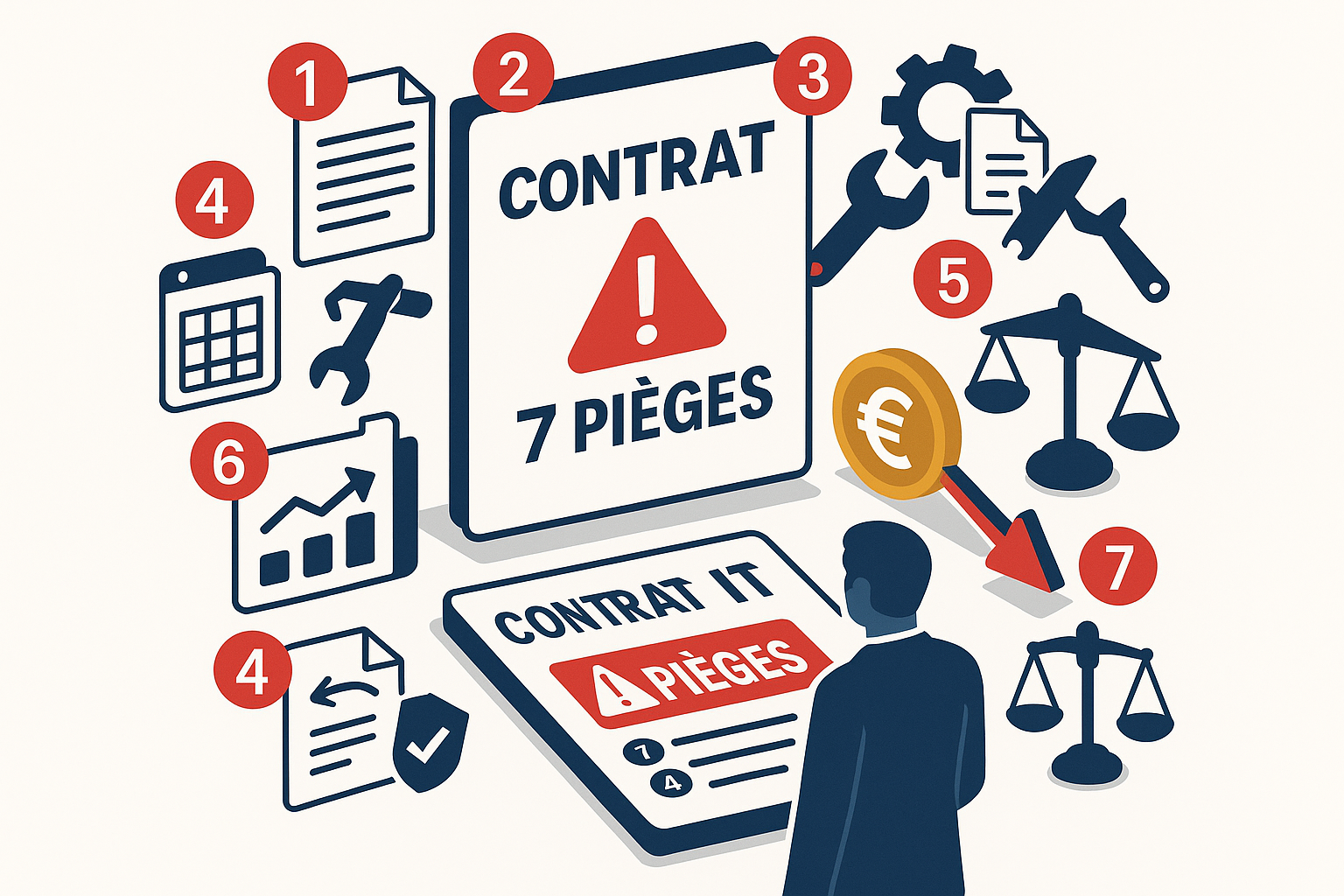
Contrats de prestation informatique : 7 pièges qui peuvent coûter cher à votre entreprise
Les contrats de prestation informatique recèlent souvent des pièges qui peuvent entraîner des conséquences considérables.
An effective website transfer strategy ensures clarity of rights and obligations, reduces legal risks and facilitates a smooth transfer, while supporting the continuity and growth of your online business.

Website transfer contracts are essential to establish a clear and secure relationship between seller and buyer. They cover a wide range of aspects, from the transfer of ownership of the site and its contents to the protection and exploitation of associated rights(RGPD, Intellectual Property, cybersecurity, etc.), while also containing classic commercial law stipulations (liability, transfer of ownership, etc.).
Advice and assistance: I offer advice and assistance throughout the key stages of a website transfer, ensuring that your interests are protected at every stage. This includes:

When transferring a website, a thorough analysis of contractual requirements is essential to identify the key elements to be transferred. This includes assessment of intellectual property rights, databases, and any licenses associated with the site. This assessment helps determine the appropriate terms to protect the interests of both parties.

Following this analysis, a contractual strategy is drawn up to ensure the protection of digital assets during the transfer. This includes drafting clauses on transfer of ownership, RGPD compliance, and guarantees linked to the quality of the assets transferred. The aim is to establish clear and legally secure agreements.

The transfer of a website involves complex technical and legal aspects. I offer training courses for your teams to make them aware of the implications of this process, such as managing intellectual property rights, data protection, and best practices to ensure a smooth transition.

Managing the transfer does not stop when the contract is signed. It's important to plan for follow-up and adjustments as the transition progresses. This includes regular legal monitoring to ensure that the transferred site remains compliant with legislative developments and industry best practices.
What are the issues involved in website transfer contracts?
Managing website transfer contracts, covering aspects such as transfer of ownership, personal data management and digital asset protection, exposes companies to significant legal and financial risks.
Sanctions or claims may arise from several sources:
Breach of contract: In the event of non-compliance with the terms of an assignment agreement, a company may suffer significant economic losses, while affecting the continuity of its online operations. Sanctions can include substantial damages, legal disputes, and forced termination of the assignment agreement.
Non-compliance with data protection obligations: Failure to comply with compliance obligations (e.g. RGPD) when transferring data associated with the website can expose the company to regulatory fines and legal action, particularly if sensitive data is inadequately protected or security obligations are not met.
Intellectual property rights disputes: Disputes concerning the transfer or unauthorized use of protected elements (such as content, source code, or databases) can lead to litigation, financial penalties, and court orders to clarify ownership of rights.
Liability for failure to transfer: When transferring a website, failure to provide all the agreed elements (access to servers, transfer of databases, etc.) may give rise to contractual liability on the part of the transferring company, leading to claims for financial loss or damages.

Les contrats de prestation informatique recèlent souvent des pièges qui peuvent entraîner des conséquences considérables.

Décryptons ensemble les points d’attention essentiels pour sécuriser juridiquement votre projet de migration vers le

Le développement d’un logiciel sur mesure représente un investissement stratégique majeur pour une entreprise. Au-delà
The transfer of a website is a crucial stage in the life of a digital company. It involves the the transfer of ownership and operating rights of a site to another entity, requiring a thorough understanding of the financial, legal and technical aspects. This transaction begins with a precise evaluation of the website, including its trafficits salesits referencingand its customer database. It is also essential to consider aspects relating to intellectual propertysuch as copyrights and software software licenses.
This transaction must be well prepared to minimize risks and maximize the benefits for both parties. The legal aspects are particularly important, including the drafting of clear clear and precise contracts that define responsibilities responsibilities of each party guarantees offeredand non-competition clauses. In addition, it is essential to comply with administrative obligationssuch as publication of the sale announcement in the BODACC and informing customers and partners.
A careful preparation and the support of a professional are highly recommended to ensure that all stages of the sale are properly followed and that the transaction is secure. In fact, a specialized lawyer can help you navigate the legal complexities and negotiate the terms of the contract to protect your interests and ensure a smooth transition.
The market value of a website is determined by several key factors. First, the traffic plays a major role. The more visitors a site generates, the higher its value. Secondly, the sales is a crucial indicator of profitability. The referencing (SEO) of the site, which influences its visibility on search engines, is also decisive.
Other elements to consider include the customer databasequality and uniqueness of contentas well as backlinks (which contribute to the site's authority. It's also important to evaluate digital assets such as software licenses, image and text copyrights, and the domain name.
To obtain an accurate evaluation, we recommend that you call on the services of a website valuation expert or a specialized lawyer. A meticulous appraisal not only enables you to set a fair fair selling pricebut also ensures that all aspects of the transaction are covered, reducing the risk of future disputes.
The process of selling of a website involves several key steps to ensure a smooth and legally secure transition. First of all, it is essential to draw up a sales contract contract. This contract must include information on the purpose of the sale, the transfer price, the terms of payment, and the guarantees offered by the seller.
Secondly, the intellectual property must be transferred, including copyrights and software licenses. It is also crucial to include non-competition clauses to protect the buyer's interests, and to specify the conditions for the transfer of data and digital digital assets.
At the same time, it is necessary to comply with administrative obligationssuch as publication of the sale announcement in the BODACC and informing customers and partners. Once these formalities have been completed, the effective transfer of the digital assets can take place, including the domain namehosting, and associated emails.
When transferring a website, certain specific specific clauses must be carefully negotiated and incorporated into the sales contract to protect the interests of both parties. These clauses include the non-competition clause is essential. It prevents the seller from creating or acquiring a similar site that could compete with the buyer, generally for a specific period and in a specific geographical area.
The warranty clause is also crucial. It commits the seller to guaranteeing that the site sold is free from disputes, undisclosed third-party rights, and complies with current regulations. In the event of non-conformity or problems discovered after the sale, this clause enables the buyer to request compensation or cancellation of the sale.
The data transfer clause must specify the terms and conditions for the transfer of all data associated such as customer databases, digital content and access to management tools. This also includes information on data security and compliance with personal data protection regulations (RGPD).
The transfer of a business often includes websites when they represent a significant part of the business activity. A goodwill is made up of various elements, such as clientelethe trade namethe licensesand contracts contracts. At the time of transfer, it is crucial to determine whether the website is an integral part of the goodwill.
Visit conditions of sale must comply with certain rules, in particular the inventory of assets transferred, the valuation of constituent parts, and the management of contracts in progress. It is also necessary to comply with legal obligationssuch as registering the sale in the Commercial Register and publishing an announcement in the BODACC.
In addition to material aspects, the sale of a business often includes intangible aspects such as copyrights, trademarks and patents. A assignment contract should include specific clauses for each type of asset, to guarantee a smooth smooth transition and transition.
The sale of a website, whether it's a simple transfer of ownership transaction or the more complex sale of a business, requires rigorous preparation and a thorough understanding of the legal, financial and technical aspects. Assessing the value of the siteand draw up a detailed detailed sales contract and include specific clauses are essential steps in securing the transaction. Calling on a specialized lawyer ensures that all aspects are covered and that the transaction runs smoothly.